|
Resources > Assessments
Note: We only make these
assessments available to people who have successfully completed at
least our SPIRAL
DYNAMICS® Level 1 training. Effective use and
interpretation require some background with the theory, as well as a
clear understanding of what the instruments can and cannot do. We do
not sell them on the open market.
THE VALUES PROFILE II:
A SPIRAL
DYNAMICS® Assessment of Worldviews
Formerly called The Values Test, the SPIRAL
DYNAMICS® Values Profile II (VPII) is newly updated and easily administered online. The VPII is 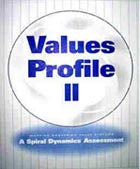 available
for a one-year trial period to NVCC-trained SD
Level 1 practitioners. and on a permanent basis to SD
Level 2 practitioners. Consisting of 10 statement clusters designed to evaluate worldviews and valuing system preferences, this popular
SPIRAL
DYNAMICS® tool is used around the world and
available in many languages via NVCC's proprietary Spiral Dynamics®
Spiral Survey System. . available
for a one-year trial period to NVCC-trained SD
Level 1 practitioners. and on a permanent basis to SD
Level 2 practitioners. Consisting of 10 statement clusters designed to evaluate worldviews and valuing system preferences, this popular
SPIRAL
DYNAMICS® tool is used around the world and
available in many languages via NVCC's proprietary Spiral Dynamics®
Spiral Survey System. .
DESCRIPTION:
The SD VPII enhances self-understanding in both business and personal settings. It is typically used in training and education, as well as coaching, though data can also be applied to strategy and marketing. VPII results appear in a profile of 14 scales – seven “acceptance” and seven “rejection” components which represent individual preferences for seven worldviews and Value Systems. Cumulative data indicate group, team, and organization-wide preferences.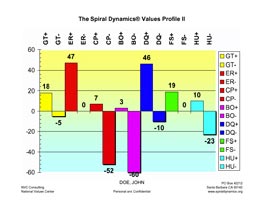
Value Systems are filters through which people think and conceptualize the world: their preferences for work environments, reward systems, personal priorities, perceived strengths and weakness.
The seven worldviews measured in VPII are based in Clare W. Graves’s Levels of Existence research and consist
of the following dimensions:
Tribalistic, Egocentric, Absolutistic, Multiplistic,
Interpersonalistic, Systemic, and Holistic. These dimensions translate into a variety of preferences impacting behavior in terms of group cohesion, conflict and collaboration, management approaches, organizational culture, leadership style, reward and leadership preferences, motivation (and de-motivation) strategies, preferred forms of communication, etc.
EXAMPLES OF SPIRAL
DYNAMICS® VALUES PROFILE II USES:
As a training tool to convey the Spiral model taught in Spiral Dynamics®
Level 1 & 2 training for specific applications
As a coaching aid for executive coaches to align to client needs/outcomes
As a team-building tool to identify interpersonal conflict & confluence
As a basis for personal development, insight and understanding of others
To understand how differences in worldviews impact cultures in collision
Enhancing recognition of deeper needs and motives, and more …
THE SPIRAL
DYNAMICS® VPII IS IDEAL FOR:
Trainers
Consultants
Coaches
Facilitators
Managers
Strategists
TIME REQUIRED FOR COMPLETION: 45-60 minutes.
Internet connection needed.
Set browser to accept cookies.
© Copyright 2006 National Values Center Consulting. All rights reserved.
Derived from The Values Test by NVC, Inc.

THE SPIRAL DYNAMICS® CHANGE STATE INDICATOR:
A Spiral Dynamics®
Assessment of Change
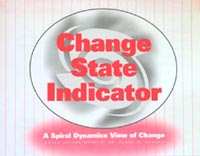
The Spiral Dynamics®
Change State Indicator is easily administered online.
It is available for a one-year trial period to
NVCC-trained SD
Level 1 practitioners. and on a permanent basis to SD
Level 2 practitioners via NVCC's proprietary Spiral Dynamics®
Spiral Survey System. Consisting of 30 questions designed to measure change readiness and preferences, it suggests the degree of ease or resistance individuals, work groups, and teams might experience
during a change process.
DESCRIPTION:
The Change State Indicator (CSI) is a versatile tool with a total of ten scales. Five scales evaluate the “states of change” experienced by people as they 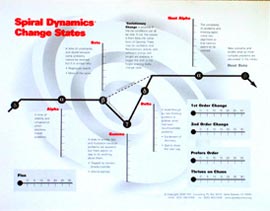 migrate from one Gravesian Value System to another. These range from stability through turbulence and back to stability. Other dimensions include readiness to accept and incorporate new methods, approaches and ideas, and five scales which convey preferences for other aspects of change: incremental or dramatic, order or chaos, plus flexibility. migrate from one Gravesian Value System to another. These range from stability through turbulence and back to stability. Other dimensions include readiness to accept and incorporate new methods, approaches and ideas, and five scales which convey preferences for other aspects of change: incremental or dramatic, order or chaos, plus flexibility.
These findings translate into a variety of workplace behaviors and preferences impacting group cohesion, management, culture, ability to innovate and learn, forms of communication, training and support needs, leadership preferences, strategy implementation, etc.
THE Spiral Dynamics®
CHANGE STATE INDICATOR HAS BEEN USED FOR SOME OF THE FOLLOWING PURPOSES:
As a training tool to convey the change model taught in Spiral Dynamics®
Levels 1 & 2
As a coaching guide for executive coaches to better understand client needs
As a team-building instrument to identify and discuss problems and conflicts
As an organizational development approach for congruent change initiatives
To understand how stress is impacting individuals and groups during
a change initiative
To plan a best fit approach to change for an individual, group or team
For personal development, insight and understanding
And more …
THE Spiral Dynamics®
CSI IS USEFUL FOR:
Trainers
Consultants (OD, strategy, change, etc.)
Coaches
Facilitators
Managers
Counselors
Change Agents
Strategic Planners
TIME REQUIRED FOR COMPLETION: 15-20 minutes
Internet connection needed. Browser must be set to accept cookies, though no personal information is harvested other than the stated demographic questions.
© Copyright 2006 National Values Center Consulting. All rights reserved.

THE SPIRAL DYNAMICS®
DISCOVER
A Spiral Dynamics®
Assessment of Levels of Existence and Coping Systems
The Discover (DSC), based on NVC’s 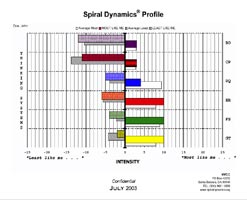 Psychological Map, Form A, is newly updated and easily administered in an online format. It is available to NVCC-certified and trained
Spiral Dynamics®
Level 2 trained practitioners. Consisting of 40 statement clusters and 10 open item stems, DSC is designed to evaluate overall levels in Gravesian thinking and coping preferences in a broad context. Psychological Map, Form A, is newly updated and easily administered in an online format. It is available to NVCC-certified and trained
Spiral Dynamics®
Level 2 trained practitioners. Consisting of 40 statement clusters and 10 open item stems, DSC is designed to evaluate overall levels in Gravesian thinking and coping preferences in a broad context.
DESCRIPTION:
The Discover is suited for use with individuals, work groups, teams and larger organizational/culture studies. It consists of 12 scales – six “most like me” and
six “least like me” dimensions. These indicate individual preferences for six worldviews and Value Systems patterns in
the Spiral model.
The six Value Systems are descriptions of how people see their worlds: their preferences for particular work environments, reward systems, career priorities, ways of behaving and interacting. The six worldviews measured are based in Clare W. Graves’s Levels of Existence Theory and
the diminsions consist of: Tribalistic, Egocentric, Absolutistic, Multiplistic, Interpersonalistic, and Systemic systems.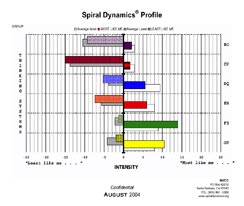
These dimensions translate into a variety of workplace behaviors and preferences impacting group cohesion, conflict and collaboration, management approaches, organizational cultures, leadership styles, reward and leader preferences, motivation strategies, effective communication, interpersonal relationships, and sensitivity to various change, strategic, and organizational development approaches.
EXAMPLES OF THE Spiral Dynamics®
DISCOVER (DSC) APPLICATIONS:
As a training tool to explain the Value Systems in the Spiral model
taught in Spiral Dynamics®
Level 1 & 2 training
As a coaching aid for executive coaches to align to client needs and goals
As a team-building instrument to foster understanding and collaboration
For insight into work group dynamics and the roots of interpersonal conflict
For personal growth, development, insight and understanding of others
To understand how differences in worldviews impact human affairs
Building greater awareness of human variability …
THE Spiral Dynamics®
DISCOVER IS IDEAL FOR:
Trainers
Consultants
Teachers
Facilitators
Managers
Coaches
TIME REQUIRED FOR COMPLETION: 30-60 minutes.
Internet connection needed. Set browser to accept cookies. No clandestine data harvesting.
© Copyright 2006 National Values Center Consulting. All rights reserved.

FOR MORE INFORMATION CONTACT:
The National Values Center Consulting
PO Box 40110
Santa Barbara, CA 93140
TEL: (805) 962 – 0366
FAX: (805) 962 – 0306
info@spiraldynamics.org
www.spiraldynamics.org
|
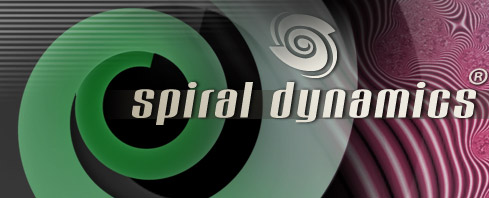


 available
for a one-year trial period to NVCC-trained
available
for a one-year trial period to NVCC-trained 

 migrate from one Gravesian Value System to another. These range from stability through turbulence and back to stability. Other dimensions include readiness to accept and incorporate new methods, approaches and ideas, and five scales which convey preferences for other aspects of change: incremental or dramatic, order or chaos, plus flexibility.
migrate from one Gravesian Value System to another. These range from stability through turbulence and back to stability. Other dimensions include readiness to accept and incorporate new methods, approaches and ideas, and five scales which convey preferences for other aspects of change: incremental or dramatic, order or chaos, plus flexibility.
 Psychological Map, Form A, is newly updated and easily administered in an online format. It is available to NVCC-certified and trained
Psychological Map, Form A, is newly updated and easily administered in an online format. It is available to NVCC-certified and trained
